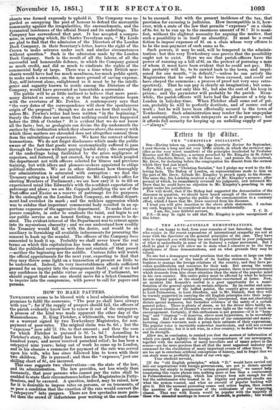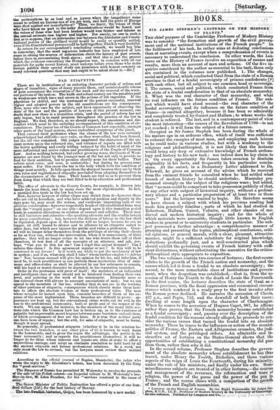THE ANTI-AUSTRIAN DEMONSTRATIONS.
Sts—I am happy to find, from your remarks of last Saturday, that those who rejoice in the recent expressions of international sympathy are not at issue with the Spectator on the general principles of the case. They have only to reproach you with being too nice and hypercritical in your judgment of what is undoubtedly in some of its features a vulgar movement. But I shall be glad if you will allow me to state what I conceive to be the true significance of these demonstrations, and on what grounds they may be valued.
No one but a demagogue would proclaim that the nation at large can take the Government out of the hands of its leading statesmen. It is their business to manage the foreign relations of the country, and they have pe- culiar qualifications and resources for their task. But among the many considerations which a Foreign Minister must ponder, there is no circumstance which demands from him closer attention than the state of the popular mind in his own country. His entire policy must be affected by what he believes he can depend upon as the steady convictions entertained at home. Now, an incident like Kossuth's arrival is a good opportunity for a mani- festation of the general opinion on certain subjects. By its cordial and sym- pathizing reception of the baffled patriot, the country gives an assurance to Lord Palmerston, to Lord Aberdeen, and to Mr. Disraeli, that they will be warmly supported in carrying the old English principles into their nego- tiations. The popular enthusiasm, rightly interpreted, does not absolutely dictate special measures, but furnishes evidence of the safety of a certain general policy. There is plenty of steam, so let the driver drive boldly on. The present situation of Denmark throws some light on the value of such an encouragement. Certainly, if this enthusiasm is not genuine—if it is "hum- bug" and "claptrap"—it deserves, above most hypocrisies, to be scornfully laid bare. But I do not think the character of our commercial and manu- facturing classes warrants such a prima. fade estimate of their expressions. The popular voice is inevitably somewhat inarticulate, and will not reward a critical analysis ; but it is not wine, in a free country, to be deaf to its tones and its strength. Allow me, in conclusion, to remind you that the sources of information of which you speak so lightly—the foreign correspondence of our newspapers, together with the narratives of many travellers and of many actors in the scenes—are far more precious than all that the most sagacious industry can command for the elucidation of many important events of other times. We are too apt to entertain artificial conceptions of history, and to forget that we can study none so profitably as that of our own age.
[If the "old English principles," which "D." would have carried out into our negotiations with foreign governments, are not to dictate special measures, but simply to inspire "a certain general policy," we cannot help translating this vague phrase into nothing more or less than a continuance in Palmerstonian protesting, which has always been safe enough for all but the unfortunates who trusted to it. Dignity and practical results are what the system wanted, and what no amount of popular backing will give it. But the moment protesting ceases and action begins, then comes the question of the genuineness of the enthusiasm of our taxpaying classes. That war with Russia would be popular with the majority of those who attended meetings in honour of Kossuth, is probable ; but would the aoolamations be as loud and ua joyous when the tavaart.orer sane round to collect an Income-tax of ten per dent, and half the ports of Europe were shut against our manufactUres? Then, we fancy-, the voices of those who have taken no part in the noisy demenstratiims would be heard, and the voices of those wbo had been loudest would. wax fainter and fainter as the annual estimate rose higher and higher. For sorely, no one is such a fool as to suppose, that an internecine war between theAbsolutist nod. Consti- tutional powers of the civilized world would be easily or speedily settled, even if the Constitutional powers could be held together, which is very doubtful. In return for our correspondent's concluding remark, we would beg him to remember, that the most sagacious industry has been employed of late years in sifting the sources of information about the history of past events, rather, than, in accumulating fresh stores; and that this is just the process which the-evidence concerning the Hungarian war, in common with all our materials for quite recent history, must undergo before even those who make foreign polines their special study can pronounce with honest certainty on many relevant questions that may and ought to be asked. about it.-1D.1



























 Previous page
Previous page